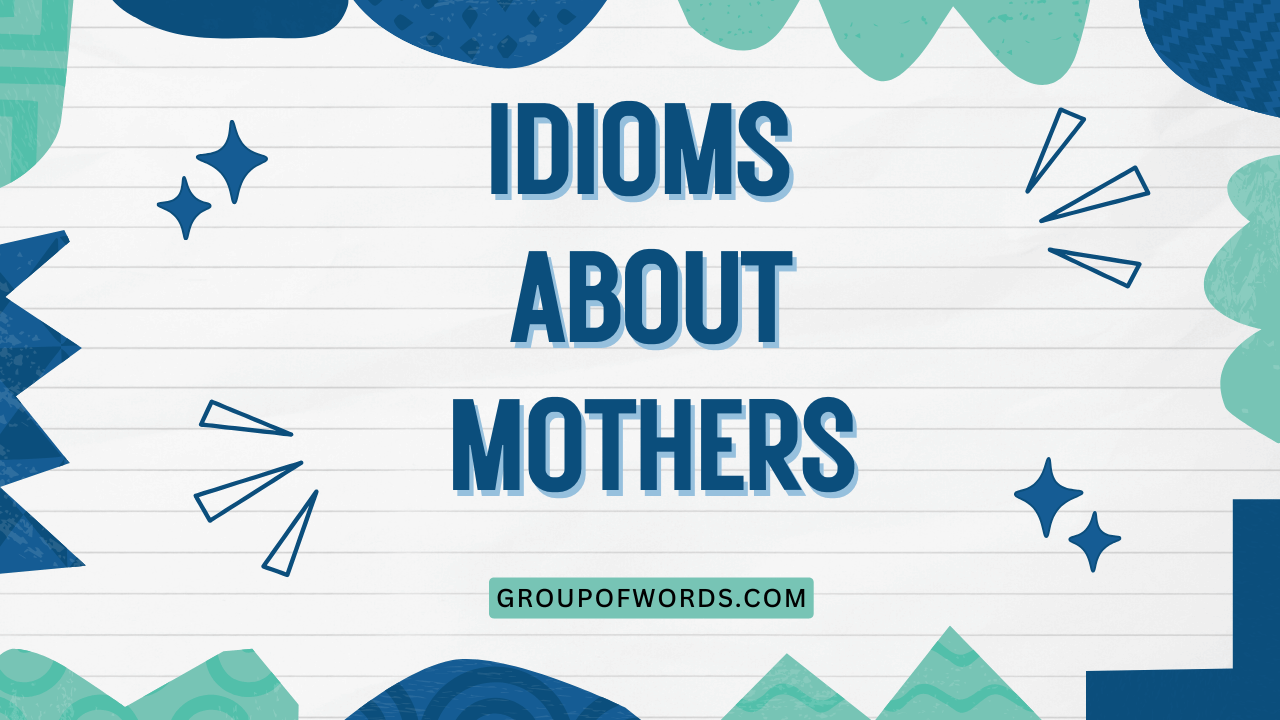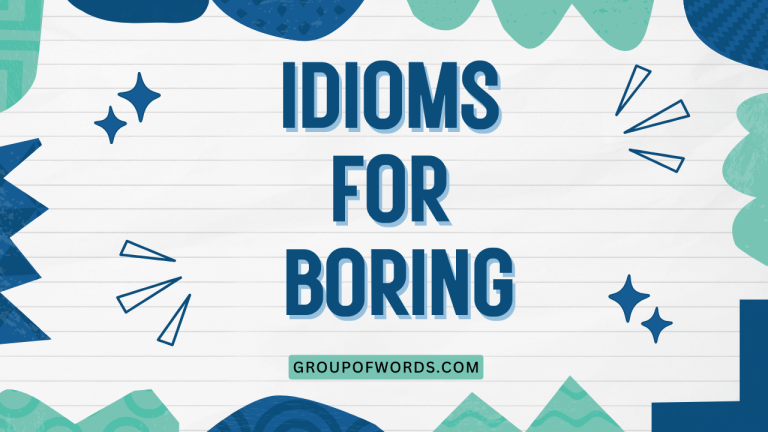Mother Knows Best: Mastering Idioms About Mothers
Idioms are colorful expressions that add depth and nuance to the English language. Understanding idioms, especially those related to mothers, is crucial for grasping cultural contexts and enhancing communication skills.
These expressions often convey complex emotions and experiences in a concise and relatable way. This article delves into the world of idioms about mothers, exploring their meanings, usage, and cultural significance.
Whether you’re an English language learner or a native speaker, this guide will help you appreciate and effectively use these idioms in your daily conversations and writing.
This article is designed for English language learners, educators, and anyone interested in enriching their understanding of English idioms. By exploring these idioms, you’ll gain a deeper appreciation for the cultural values and perspectives associated with motherhood.
This knowledge will empower you to communicate more effectively and connect with others on a more meaningful level.
Table of Contents
- Definition of Idioms About Mothers
- Structural Breakdown of Idioms
- Types and Categories of Mother-Related Idioms
- Examples of Idioms About Mothers
- Usage Rules for Idioms About Mothers
- Common Mistakes with Idioms About Mothers
- Practice Exercises
- Advanced Topics: Cultural Nuances
- Frequently Asked Questions
- Conclusion
Definition of Idioms About Mothers
An idiom is a phrase or expression whose meaning cannot be understood from the ordinary meanings of the words it contains. In other words, it’s a figurative expression where the overall meaning is different from the literal meaning of the individual words.
Idioms about mothers are a subset of these expressions that specifically relate to the role, characteristics, or experiences associated with mothers.
These idioms often reflect cultural values and societal perceptions of motherhood. Understanding them requires not only knowing the literal definitions of the words but also grasping the implied meaning and context in which they are used.
They function as a shorthand way of conveying complex ideas or emotions related to maternal figures.
Classification: Idioms can be classified based on their structure (e.g., phrasal verbs, proverbs) or their thematic content (e.g., idioms about love, idioms about time). Idioms about mothers fall under the thematic classification, focusing on maternal themes.
Function: The primary function of these idioms is to add color and expressiveness to language. They allow speakers and writers to convey nuanced meanings and evoke emotional responses in a way that literal language often cannot. They can also serve as a form of cultural reference, connecting people through shared understanding.
Contexts: Idioms about mothers are used in a variety of contexts, including everyday conversations, literature, movies, and even business communication. Their appropriateness depends on the audience and the overall tone of the communication. In formal settings, it’s generally best to use idioms sparingly or avoid them altogether, unless you are certain that they will be understood and appreciated.
Structural Breakdown of Idioms
Idioms, while seemingly simple, often have complex underlying structures. Understanding these structures can help in both comprehension and usage.
Fixed Expressions: Most idioms are fixed expressions, meaning that the words cannot be changed or rearranged without altering the meaning or making the idiom nonsensical. For example, you can’t say “Mother knows bestly” or “Best knows mother” and retain the original meaning of “Mother knows best.”
Figurative Language: Idioms rely heavily on figurative language, such as metaphors, similes, and personification. These literary devices create an image or comparison that helps to convey the intended meaning. For instance, “to be tied to one’s mother’s apron strings” uses the image of apron strings to represent dependence.
Underlying Meaning: The meaning of an idiom is often unrelated to the literal meaning of the words. Instead, the meaning is derived from cultural context and historical usage. The idiom “like mother, like daughter” suggests that daughters often inherit traits or behaviors from their mothers. The phrase does not literally mean that the daughter is physically similar to the mother, but instead implies shared characteristics.
Variations: While most idioms are fixed, some may have slight variations in wording. However, it’s important to be aware of these variations and use them correctly. For example, “a mama’s boy” and “a mother’s boy” are both acceptable, but “a mother’s daughter” is not typically used to describe a male, and would relate to the phrase “like mother like daughter” instead.
Types and Categories of Mother-Related Idioms
Idioms about mothers can be categorized based on the specific aspect of motherhood they address. Here are some common categories:
Expressions of Maternal Wisdom
These idioms emphasize the knowledge, experience, and guidance that mothers provide. They often suggest that mothers have a unique insight into situations and can offer valuable advice.
Expressions of Maternal Love and Care
These idioms highlight the nurturing, protective, and supportive qualities of mothers. They convey the deep bond between a mother and her child and the sacrifices that mothers often make.
Expressions of Maternal Influence
These idioms focus on the impact that mothers have on their children’s lives, shaping their values, beliefs, and behaviors. They often suggest that a mother’s influence is long-lasting and profound.
Expressions of Maternal Dependence
These idioms describe situations where individuals are overly reliant on their mothers, often to the point of being unable to function independently. These expressions can be negative, implying a lack of maturity or self-reliance.
Expressions of Maternal Strength and Resilience
These idioms celebrate the inner strength, resilience, and determination of mothers, particularly in the face of adversity. They portray mothers as strong figures who are able to overcome challenges and provide stability for their families.
Examples of Idioms About Mothers
Here are some examples of idioms about mothers, categorized by the themes mentioned above. Each example includes the idiom, its meaning, and a sample sentence.
Examples of Maternal Wisdom
The following table illustrates idioms associated with maternal wisdom. These idioms often highlight the mother’s role as a source of guidance and insight.
| Idiom | Meaning | Example Sentence |
|---|---|---|
| Mother knows best | Mothers are often right because of their experience. | I thought I knew better, but mother knows best – she was right about the stock market crash. |
| Ask your mother | A way of deferring to the mother’s judgment or knowledge. | I’m not sure if you can go to the party; ask your mother. |
| Mother’s intuition | A mother’s innate sense about her child’s well-being. | I had a bad feeling about the trip, it must have been mother’s intuition. |
| A mother’s love is the best medicine. | The care and affection of a mother can heal emotional wounds. | After failing the exam, John needed a mother’s love is the best medicine, and his mom provided it. |
| What would your mother say? | Used to question the appropriateness of someone’s behavior. | Are you sure you want to spend all your money on that? What would your mother say? |
| The way to a man’s heart is through his stomach | Often attributed to a mother’s advice on how to care for a man. | My mother always told me that the way to a man’s heart is through his stomach, so I learned to cook. |
| A mother’s work is never done | Mothers are always busy taking care of their families. | Even after the kids moved out, a mother’s work is never done; she’s always helping someone. |
| Go ask your mother. | A parent’s way of passing responsibility to the other parent. | I’m not sure if you can have a cookie before dinner, go ask your mother. |
| A mother’s hug can last long after she lets go. | The comfort and security provided by a mother’s embrace is long-lasting. | Even now, I remember my mother’s hugs; a mother’s hug can last long after she lets go. |
| Like mother, like son. | Sons often share traits or behaviors with their mothers. | He’s always been good with his hands, like mother, like son; she’s a skilled carpenter. |
| A mother’s treasure is her daughter. | Daughters are highly valued and cherished by their mothers. | She always says a mother’s treasure is her daughter, and treats her like a princess. |
| A mother always knows. | Mothers have an uncanny ability to understand their children. | You can’t hide anything from her; a mother always knows. |
| Mother Earth | The earth is often seen as a nurturing and life-giving force. | We should respect Mother Earth and protect our environment. |
| Home is where your mother is. | A mother’s presence makes a place feel like home. | I can’t wait to go back; home is where your mother is. |
| A mother’s love is a blessing | The love of a mother is a precious gift. | I am grateful for a mother’s love is a blessing in my life. |
| A good mother is worth more than a hundred schoolmasters. | A mother’s influence and guidance are invaluable. | They say a good mother is worth more than a hundred schoolmasters, and I believe it. |
| Mother Nature | The forces of nature personified as a nurturing and powerful woman. | Mother Nature can be both beautiful and destructive. |
| A mother understands what a child does not say. | Mothers are intuitive and perceptive about their children’s needs. | She knew something was wrong even before I said anything; a mother understands what a child does not say. |
| Where mother is, there is home. | A mother’s presence creates a sense of belonging and security. | No matter where we go, where mother is, there is home. |
| Only a mother knows a mother’s grief. | The pain of losing a child is uniquely understood by other mothers. | She found solace in a support group because only a mother knows a mother’s grief. |
| The hand that rocks the cradle rules the world. | Mothers have a powerful influence on society through raising children. | They say the hand that rocks the cradle rules the world, and it’s true. |
Examples of Maternal Love and Care
The following table showcases idioms that express the deep love and care that mothers have for their children.
| Idiom | Meaning | Example Sentence |
|---|---|---|
| To be tied to one’s mother’s apron strings | To be overly dependent on one’s mother. | He’s thirty years old and still tied to his mother’s apron strings. |
| A mother’s love knows no bounds | A mother’s love is limitless and unconditional. | She would do anything for her children; a mother’s love knows no bounds. |
| To be the apple of one’s mother’s eye | To be someone’s favorite person. | She was always the apple of her mother’s eye. |
| A mother’s heart | Refers to the unique capacity for love, compassion, and forgiveness that mothers possess. | Despite his mistakes, she forgave him with a mother’s heart. |
| Blood is thicker than water | Family bonds are stronger than other relationships. | Even though they argue, blood is thicker than water, and they’ll always be there for each other. |
| A mother hen | Someone who is very protective and nurturing. | She’s such a mother hen, always worrying about her kids. |
| To run to one’s mother | To seek comfort or help from one’s mother. | Whenever he’s upset, he runs to his mother for advice. |
| A mother’s touch | The unique comfort and care that only a mother can provide. | He felt better as soon as he felt a mother’s touch. |
| To mother someone | To take care of someone in a nurturing way. | She always mothers her friends when they’re feeling down. |
| A mother’s guiding hand | The influence and direction a mother provides to her children. | He succeeded in life thanks to a mother’s guiding hand. |
| A mother’s sacrifice | The selfless acts a mother does for her children. | She made many a mother’s sacrifice to ensure her children had a good education. |
| A mother’s comfort | The soothing and reassuring presence of a mother. | He found a mother’s comfort in her warm embrace. |
| To be under one’s mother’s wing | To be protected and cared for by one’s mother. | Even as a teenager, he was still under his mother’s wing. |
| A mother’s embrace | The warm and loving hug of a mother. | She longed for a mother’s embrace after a long day. |
| A mother’s watchful eye | The protective and attentive gaze of a mother. | He knew he was safe under a mother’s watchful eye. |
| A mother’s gentle hand | The kind and caring touch of a mother. | She appreciated a mother’s gentle hand when she was sick. |
| A mother’s endless patience | The unwavering patience of a mother. | Raising children requires a mother’s endless patience. |
| A mother’s unconditional love | The love of a mother that is given freely and without expectation. | He was grateful for a mother’s unconditional love, even when he made mistakes. |
| A mother’s tender care | The gentle and loving care of a mother. | She recovered quickly thanks to a mother’s tender care. |
| A mother’s nurturing spirit | The inherent ability of a mother to provide care and support. | Her a mother’s nurturing spirit made her a great teacher. |
| A mother’s protective instinct | The natural impulse of a mother to protect her children. | Her a mother’s protective instinct kicked in when she saw the dog approach her child. |
Examples of Maternal Influence
This table shows idioms that exemplify the significant influence mothers have on their children’s lives.
| Idiom | Meaning | Example Sentence |
|---|---|---|
| Like mother, like daughter | Daughters often share traits or behaviors with their mothers. | She’s a talented artist, like mother, like daughter. |
| To follow in one’s mother’s footsteps | To pursue the same career or path as one’s mother. | She decided to follow in her mother’s footsteps and become a doctor. |
| A chip off the old block | Someone who resembles their parent in character or behavior. | He’s a real chip off the old block, just like his mother. |
| The fruit doesn’t fall far from the tree | Children often resemble their parents in character or behavior. | He’s always getting into trouble; the fruit doesn’t fall far from the tree. |
| To take after one’s mother | To resemble one’s mother in appearance or character. | She takes after her mother in both looks and personality. |
| A mother’s legacy | The values, beliefs, and traditions passed down from a mother. | She carried on a mother’s legacy of kindness and generosity. |
| To be raised by a strong mother | To be influenced by a mother who is resilient and independent. | He credits his success to being raised by a strong mother. |
| A mother’s influence | The impact a mother has on her child’s development and choices. | She felt a mother’s influence in every decision she made. |
| To learn from one’s mother | To gain knowledge and skills from one’s mother. | She learned from her mother how to cook and sew. |
| A mother’s teachings | The lessons and values imparted by a mother. | He remembered a mother’s teachings throughout his life. |
| To inherit one’s mother’s traits | To acquire characteristics from one’s mother through genetics or upbringing. | She seemed to inherit her mother’s traits of intelligence and wit. |
| A mother’s example | The behavior and actions of a mother that serve as a model for her children. | She tried to live up to a mother’s example of hard work and integrity. |
| To carry on one’s mother’s name | To continue a family tradition or legacy. | She was proud to carry on her mother’s name and continue her work. |
| A mother’s principles | The moral and ethical standards instilled by a mother. | He lived by a mother’s principles of honesty and fairness. |
| To follow one’s mother’s advice | To heed the guidance and suggestions of one’s mother. | She always followed her mother’s advice, knowing it was wise. |
| A mother’s values | The beliefs and ideals instilled by a mother. | He cherished a mother’s values of family and community. |
| To emulate one’s mother | To imitate or try to be like one’s mother. | She tried to emulate her mother in her career and personal life. |
| A mother’s imprint | The lasting effect a mother has on her child’s life. | She felt a mother’s imprint on her heart always. |
| To honor one’s mother | To show respect and gratitude for one’s mother. | He always made sure to honor his mother on her birthday. |
| A mother’s guidance | The direction and support a mother provides to her children. | He was grateful for a mother’s guidance in navigating life’s challenges. |
| To live up to one’s mother’s expectations | To meet the standards and hopes set by one’s mother. | She worked hard to live up to her mother’s expectations. |
Examples of Maternal Dependence
The following table provides idioms that describe situations where individuals are overly reliant on their mothers.
| Idiom | Meaning | Example Sentence |
|---|---|---|
| Mama’s boy | A man who is overly attached to his mother. | He’s such a mama’s boy; he still lives at home and his mother does everything for him. |
| To be spoon-fed by one’s mother | To be given excessive help and coddling by one’s mother. | He’s been spoon-fed by his mother his whole life, so he doesn’t know how to do anything himself. |
| To cling to one’s mother | To be emotionally dependent on one’s mother. | He still clings to his mother for emotional support, even though he’s an adult. |
| To be tied to one’s mother’s apron strings | To be overly dependent on one’s mother. | He’s thirty years old and still tied to his mother’s apron strings. |
| Under one’s mother’s thumb | Controlled or dominated by one’s mother. | He’s always been under his mother’s thumb, never making his own decisions. |
| To need one’s mother’s approval | To require validation from one’s mother before making decisions. | He always needs his mother’s approval before making any major life choices. |
| To be unable to leave one’s mother’s side | To be incapable of being independent from one’s mother. | He seems to be unable to leave his mother’s side, even for a short trip. |
| To rely on one’s mother for everything | To depend on one’s mother for all aspects of life. | He relies on his mother for everything, from cooking to paying bills. |
| To be coddled by one’s mother | To be overprotected and pampered by one’s mother. | He was coddled by his mother and never learned to be independent. |
| To be unable to function without one’s mother | To be completely dependent on one’s mother for daily tasks. | He seems to be unable to function without his mother, even for simple tasks. |
Usage Rules for Idioms About Mothers
Using idioms correctly requires an understanding of their specific meanings and the contexts in which they are appropriate. Here are some rules to keep in mind:
Know the meaning: Always be sure you understand the meaning of an idiom before using it. Using an idiom incorrectly can lead to confusion or miscommunication.
Consider the context: Idioms are not appropriate for all situations. Avoid using them in formal writing or when speaking to someone who may not be familiar with English idioms. In casual conversations or informal writing, they can add color and expressiveness.
Use them sparingly: Overusing idioms can make your language sound unnatural or forced. Use them judiciously to enhance your communication, not to overwhelm it.
Maintain the structure: Most idioms are fixed expressions, so be careful not to change the wording or structure. Altering an idiom can change its meaning or make it nonsensical.
Be aware of cultural differences: Some idioms may have different meanings or connotations in different cultures. Be mindful of your audience and avoid using idioms that may be offensive or confusing.
Understand the emotional tone: Some idioms convey positive emotions, while others convey negative emotions. Use idioms that are appropriate for the emotional tone of your communication.
Common Mistakes with Idioms About Mothers
Even experienced English speakers sometimes make mistakes when using idioms. Here are some common errors to watch out for:
- Misunderstanding the meaning: The most common mistake is simply misunderstanding the meaning of an idiom. For example, thinking that “tied to one’s mother’s apron strings” means being close to one’s mother, rather than being overly dependent.
- Altering the wording: Changing the words in an idiom can alter its meaning or make it nonsensical. For example, saying “mother knows bestly” instead of “mother knows best.”
- Using idioms in inappropriate contexts: Using idioms in formal writing or when speaking to someone unfamiliar with English can be inappropriate.
- Overusing idioms: Using too many idioms can make your language sound unnatural or forced.
Here are some examples of common mistakes and their corrections:
| Incorrect | Correct | Explanation |
|---|---|---|
| Mother knows good. | Mother knows best. | The correct idiom is “Mother knows best.” |
| He is tied to his mother’s string. | He is tied to his mother’s apron strings. | The correct idiom is “tied to one’s mother’s apron strings.” |
| She is the apple of her mother’s eyes. | She is the apple of her mother’s eye. | The correct idiom is “the apple of one’s mother’s eye” (singular). |
| Like mother, like a daughter. | Like mother, like daughter. | The correct idiom is “Like mother, like daughter.” |
| Blood is more thick than water. | Blood is thicker than water. | The idiom is “Blood is thicker than water.” |
Practice Exercises
Test your understanding of idioms about mothers with these practice exercises.
Exercise 1: Fill in the Blanks
Complete the following sentences with the correct idiom from the list below.
Idiom List: Mother knows best, like mother like daughter, mama’s boy, blood is thicker than water, follow in her mother’s footsteps
| Question | Answer |
|---|---|
| 1. She always gives great advice because __________. | Mother knows best |
| 2. She became a teacher, just __________. | follow in her mother’s footsteps |
| 3. He still lives at home and his mother does everything for him; he’s such a __________. | mama’s boy |
| 4. They argue all the time, but __________. | blood is thicker than water |
| 5. She’s a talented musician, __________. | like mother like daughter |
| 6. Even now, I still feel she __________. | mother knows best |
| 7. He always wanted to be a doctor, __________. | follow in her mother’s footsteps |
| 8. He’s 40 years old and still a __________. | mama’s boy |
| 9. They may disagree, but __________. | blood is thicker than water |
| 10. She is also a talented chef, __________. | like mother like daughter |
Exercise 2: Matching
Match the idiom with its correct meaning.
| Idiom | Meaning |
|---|---|
| 1. To be tied to one’s mother’s apron strings | a. Daughters often share traits with their mothers. |
| 2. Like mother, like daughter | b. A man overly attached to his mother. |
| 3. Mama’s boy | c. To be overly dependent on one’s mother. |
| 4. A mother’s love knows no bounds | d. A mother’s love is limitless. |
| 5. To be the apple of one’s mother’s eye | e. To be someone’s favorite person. |
Answers: 1-c, 2-a, 3-b, 4-d, 5-e
Exercise 3: Multiple Choice
Choose the correct meaning of the idiom in the sentence.
| Question | Options | Answer |
|---|---|---|
| 1. He always runs to his mother when he has a problem. What does “runs to his mother” mean? | a. Seeks physical comfort from his mother. b. Seeks advice or help from his mother. c. Literally runs to his mother’s location. | b |
| 2. She’s a real mother hen, always worrying about her kids. What does “mother hen” mean? | a. A chicken. b. Someone who is very protective and nurturing. c. Someone who is bossy. | b |
| 3. She’s always following in her mother’s footsteps. What does “following in her mother’s footsteps” mean? | a. Walking behind her mother. b. Pursuing the same career or path. c. Copying her mother’s fashion style. | b |
| 4. He’s a chip off the old block, just like his mother. What does “chip off the old block” mean? | a. He is made of wood. b. He resembles his mother in character. c. He is small and insignificant. | b |
| 5. Blood is thicker than water, so family will always come first. What does “blood is thicker than water” mean? | a. Water is not as important as blood. b. Family bonds are stronger than other relationships. c. Blood is thicker in consistency than water. | b |
Advanced Topics: Cultural Nuances
Idioms about mothers often carry cultural nuances that can vary across different societies. Understanding these nuances is crucial for effective cross-cultural communication.
Varying Perceptions of Motherhood: Different cultures may have different expectations and perceptions of motherhood. For example, in some cultures, mothers are expected to be highly involved in their children’s lives well into adulthood, while in others, children are encouraged to become independent at a younger age. These cultural differences can influence the meaning and usage of idioms about mothers.
Impact of Societal Norms: Societal norms and values can also shape the way idioms about mothers are used. For example, in cultures that place a high value on family and tradition, idioms emphasizing the importance of maternal influence may be more common. Conversely, in cultures that prioritize individualism and independence, idioms highlighting maternal dependence may be viewed more negatively.
Regional Differences: Even within the same language, idioms about mothers can vary across different regions. These regional variations may reflect local customs, dialects, and historical influences. Being aware of these differences can help you avoid misunderstandings and communicate more effectively with people from different regions.
Frequently Asked Questions
Here are some frequently asked questions about idioms about mothers:
Q1: Why is it important to learn idioms about mothers?
A: Learning idioms about mothers is important because they provide insights into cultural values and perceptions of motherhood. They also allow you to communicate more effectively and expressively, adding depth and nuance to your language.
Q2: Are idioms about mothers used in formal writing?
A: Generally, idioms should be used sparingly in formal writing. However, if the context is appropriate and the audience is familiar with the idiom, it can be used to add emphasis or color to your writing. Always consider the tone and purpose of your writing when deciding whether to use an idiom.
Q3: How can I improve my understanding of idioms about mothers?
A: The best way to improve your understanding of idioms is to read widely, listen to native speakers, and pay attention to the context in which idioms are used. You can also use online resources and idiom dictionaries to look up the meanings of unfamiliar idioms.
Q4: Are there any idioms about fathers that are
similar to idioms about mothers?
A: Yes, there are many idioms about fathers that share similar themes with idioms about mothers, such as wisdom, love, influence, and dependence. For example, just as “mother knows best,” there’s “father knows best.” The specific idioms and their cultural connotations can vary, but the underlying concepts are often parallel.
Conclusion
Idioms about mothers offer a fascinating glimpse into the cultural values and perceptions surrounding motherhood. By understanding these expressions, you can enhance your communication skills, connect with others on a deeper level, and gain a greater appreciation for the multifaceted role of mothers in society.
Whether you are an English language learner or a native speaker, mastering these idioms will enrich your linguistic repertoire and broaden your cultural awareness.
Continue to explore and practice using idioms about mothers in your daily conversations and writing. Pay attention to the context in which they are used and be mindful of cultural nuances.
With practice, you’ll become more confident and proficient in using these colorful expressions to convey your thoughts and feelings effectively.






